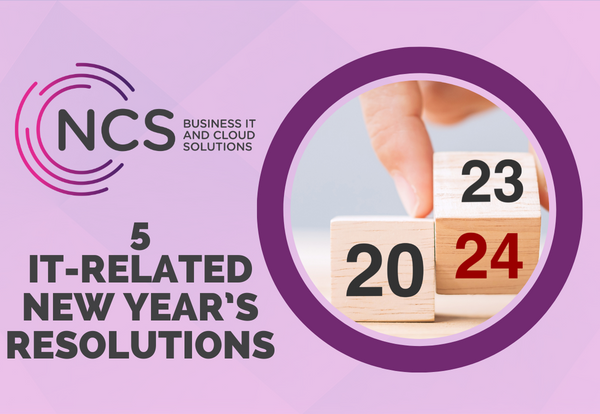5 IT-Related New Year’s Resolutions
| Nearly 3 weeks in to 2024 and you may have already forgotten about those New Year’s Resolutions you made at the start of the year, but here’s 5 IT-related New Year’s Resolutions that it would be good to keep! |
Make sure you patch and update all of your IT equipment regularly (this includes all those updates that appear on your smartphone too!). This is one of the most effective things you can do to protect your computer and network. Ensure all updates and security patches are installed as soon as they become available.
For PCs, you can turn on Automatic Updates. For fileservers, if your server is actively monitored by us, this should already be done but if you maintain yours in-house, it is critical these are patched as soon as possible and kept current with the latest updates. Microsoft releases patches on a schedule for fileservers. |
| 2. Power down your computer
You should power your computer properly and often. It’s better for the computer! If you switch off at the mains too, the environment and your bank account will also benefit! |
| 3. Use Multifactor Authentication
Multifactor authentication (MFA) is an extra layer of security which makes it harder for hackers to attack and to gain unauthorised access to your email account.
When you sign into your online accounts, you have to prove you are who you say you are, in order to gain access. Traditionally you have done this by inputting your username (or email address) and a password.
Unfortunately, this is not enough anymore. Usernames are easy to find or guess (especially if it is your email address) and people tend to pick simple passwords or use the same password on multiple sites to make it easier for them (anyone using password1 still?) This is why most online services including banks, social media, shopping, and your Microsoft 365 account, have added Multifactor Authentication to make your account more secure.
We have been recommending our customers use MFA for a while, and have made a decision to add MFA for FREE to all of our customers with Microsoft 365 email accounts. Going forward we will also be adding MFA as standard to any new Microsoft 365 accounts that we set up.
|
| 4. Be Mindful of Phishing Attempts
Phishing attacks are happening more and more targeting businesses of all sizes and sectors. Attackers attempt to trick your staff into doing the wrong thing (the bait). This might include clicking on a link in an email which will in turn download malware onto your IT network or might direct you to a dodgy website that can try to steal your credentials or data.
Phishing can take many forms though and attackers use a variety of methods, not just emails – though this seems to be the most prevalent at the moment. Attackers can also target users on text messages, on social media or by telephone.
You can read more about phishing attacks on our website here > |
| 5. Make sure Backups are in place
All businesses regardless of size and sector, should do regular backups of their data. Backups are copies of your business’ essential data – that is the information your business couldn’t function without. For example, documents, financial data, photos, email, contact information and calendars.
In the event of hardware failure, ransomware or virus attacks, theft or even just accidental deletion and you lost everything, would you be able to recover your data from a backup? The impact of any of these situations could be very costly, even catastrophic for your business.
|
| To learn more about any of these, get in touch with our Sales team. |


